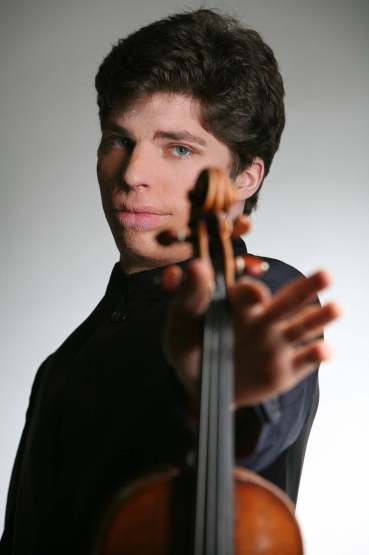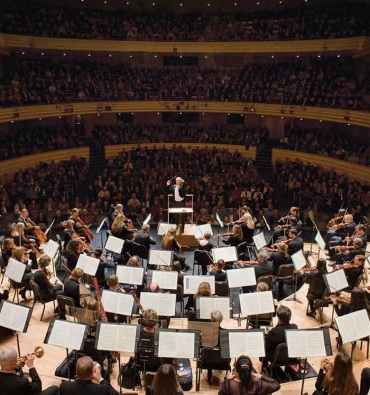The Well-Tempered Ear
Classical music: From farm accident to international violin virtuoso: Augustin Hadelich will solo with the Madison Symphony Orchestra this weekend. | November 12, 2013
By Jacob Stockinger
The Ear thinks that discovering and then booking young up-and-coming violinists is among the biggest success stories that the Madison Symphony Orchestra and its music director and conductor John DeMain have had over the last 20 years, ever since DeMain arrived in Madison.
One example is the Austrian violinist Augustin Hadelich, below.
Another is the Norwegian violinist Henning Kraggerud, below.
Both Hadelich and Kraggerud seem totally natural and complete artists who do exactly what a world-class virtuoso should do: Make the difficult seem effortless without sacrificing musicality.
Hadelich — who also has a compelling personal back story that involves overcoming adversity — will solo again this weekend with the MSO.
Here is the informative press release from the orchestra:
“How does one goes from a farm accident of severe burns to becoming a violin virtuoso, who enchants millions all over the world?
“Augustin Hadelich (pronounced HOD-uh-lick), a child prodigy with a violin in rural Tuscany, was told he might never play a violin again after he barely survived a farm accident that burned his home and him, including his bow arm at age 15.
From those challenging days, he has emerged as a violinist of international renown, who will return to Madison again to join John DeMain and the Madison Symphony Orchestra for three performances this weekend in Overture Hall.
Hadelich will take the stage in the first half to perform Edouard Lalo’s exotic Symphonie Espagnole, a virtuosic concerto with a lush Spanish flavor that he performed in his 2012 debut with the New York Philharmonic Orchestra.
The concert will open with the wild and spontaneous Too Hot Toccata, by American composer Aaron Kernis.
The Symphony No. 2, by Sergei Rachmaninoff, is a monumental late Romantic work. It is a lush, unmistakably Russian work, and it will close the program. (The melody-rich work’s third movement — the slow Adagio that can be heard at the bottom in a popular YouTube video with conductor Andre Previn and the NHK Symphony Orchestra of Tokyo, part of the public broadcasting system in Japan — more than “inspired” the bestselling pop song “Never Gonna Love Again.” Carmen also “borrowed” from Rachmaninoff’s Piano Concerto No. 2 for his bestselling song “All By Myself.”)
The concerts are in the Overture Center’s Overture Hall on Friday, Nov. 15 at 7:30 p.m.; Saturday, Nov. 16, at 8 p.m.; and Sunday, Nov. 17, at 2:30 p.m. in Overture Hall, 201 State Street.
A free prelude discussion by UW-Madison musicology professor Charles Dill (below, in a photo by Katrin Talbot for the UW School of Music) will take place one hour before each performance.
For more information, including a link to Augustin Hadelich’s website, critics’ reviews and audio/video samples, visit:
http://www.madisonsymphony.org/hadelich
Here is a link to program by notes by MSO trombonist J. Michael Allsen (below, in a photo by Katrin Talbot for the Madison Symphony Orchestra) who teaches at UW-Whitewater:
ttp://facstaff.uww.edu/allsenj/MSO/NOTES/1314/3.Nov13.htm
“Symphonie Espagnole” remains Lalo’s most popular work. He composed it during a period when French composers were fascinated with Spanish music, and Lalo (below) tastefully incorporates this culture’s melodic and dance figures into the work. The soaring violin parts require both technical precision and immense musicianship.
Hadelich is often noted in the media for his “gorgeous tone,” “poetic communication” and “fast-fingered brilliance.” The New York Times wrote, “[Hadelich] has become one of the most distinctive violinists of his generation…he plays with dazzling technique, a gorgeous tone, and penetrating, spontaneous musicality.”
Kernis (below) describes his “Too Hot Toccata” as predominantly “high energy” and “out of control.” Composed in 1996, the piece excitedly works through a series of furious, oddly-metered and sometimes jazzy ideas. Multiple players in the ensemble are featured with virtuosic solos, including violin, clarinet, piccolo, trumpet and percussion.
In his Symphony No. 2, Rachmaninoff (below) achieves an unending and beautiful flow of melody, citing a motto from the opening bars throughout the piece. This is especially impressive given the size of the composition. The 320-page, carefully detailed score rivals the largest of Anton Bruckner’s or Gustav Mahler’s scores in length and breadth. The piece also promises some orchestral fireworks during an hour-long sonic experience.
Tickets are $16.50 to $82.50 each, available at www.madisonsymphony.org/singletickets and through the Overture Center Box Office at 201 State Street or call the Box Office at (608) 258-4141.
New subscribers can receive up to a 50% discount. For more information and to subscribe, visit: www.madisonsymphony.org/newsub or call (608) 257-3734.
Groups of 15 or more can save 25% by calling the MSO office at (608) 257-3734. For more information visit, www.madisonsymphony.org/groups
Student rush tickets can be purchased in person on the day of the concert at the Overture Box Office at 201 State Street. Full-time students must show a valid student ID and can receive up to two $12 or $15 tickets. More information is at: www.madisonsymphony.org/studentrush On advance ticket purchases, students can receive 20% savings on seats in select areas of the hall.
Seniors age 62 and up receive 20% savings on advance and day-of-concert ticket purchases in select areas of the hall.
Discounted seats are subject to availability, and discounts may not be combined.
The Madison Symphony Orchestra is marking its 88th concert season in 2013-2014 by celebrating John DeMain’s 20th anniversary as music director. The Symphony engages audiences of all ages and backgrounds in live classical music through a full season of concerts with established and emerging soloists of international renown, an organ series that includes free concerts, and widely respected education and community engagement programs. Find more information at www.madisonsymphony.org.
Major funding for this concert is provided by the Steinhauer Charitable Trust, UW Health Burn Center and UW-Madison Department of Surgery, and Rosemarie Blancke with additional funds from DeEtte Beilfuss-Eager and Leonard P. Eager, Jr., and the Wisconsin Arts Board.
Tags: Aaron Kernis, All By Myself, Andre Previn, Anton Bruckner, Augustin Hadelich, Eric Carmen, Gustav Mahler, Henning Kraggerud, Jacob Stockinger, John DeMain, Madison, Madison Symphony Orchestra, New York Philharmonic Orchestra, New York Times, NHK Symphony Orchestra, Overture Center, Sergei Rachmaninoff, Symphonie Espagnole, University of Wisconsin-Whitewater, University of Wisconsin–Madison, YouTube
Leave a Comment »









Leave a comment